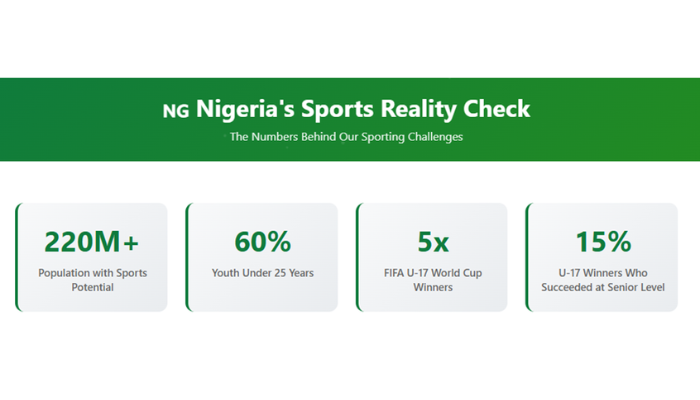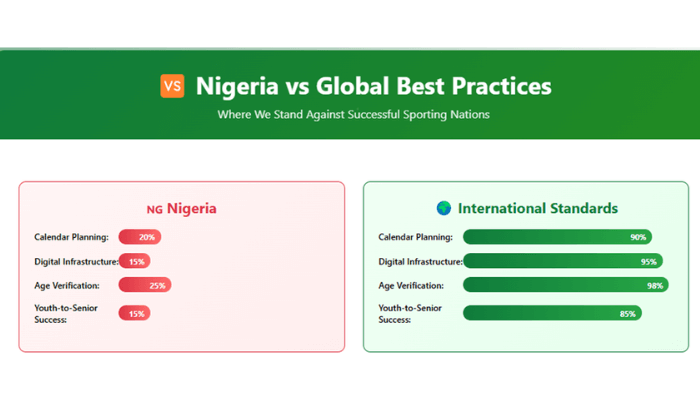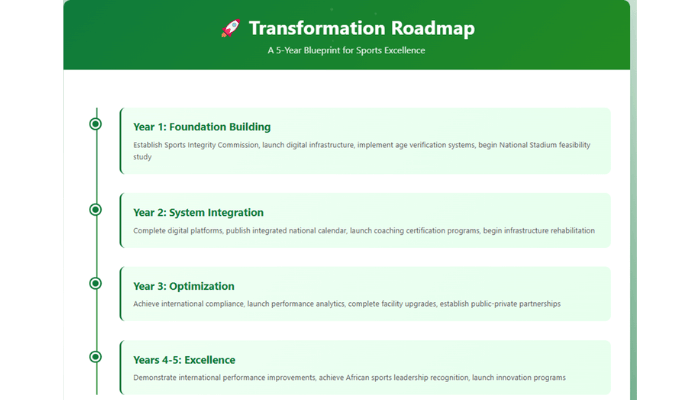By Dr. Oluyemi Adeosun

Nigeria’s sporting potential remains trapped by systemic failures that transform promise into perpetual disappointment.
With over 220 million citizens and a youth demographic exceeding 60 percent of our population, we possess the raw human capital to dominate international competitions. Yet institutional corruption, strategic misalignment, and administrative incompetence continue squandering this immense potential.
As parents embedded in competitive sports, we witness daily how our talented children are failed by systems designed more for personal enrichment than national excellence. The time for cosmetic reforms has expired; revolutionary change is essential.
Every delay costs us another generation of world-class athletes who abandon sports or represent other nations because Nigeria cannot provide the structure they deserve.
“Public-private partnerships must leverage corporate expertise and investment while maintaining accessibility, developing tax incentives for sports investment, and creating sustainable revenue through competitive bidding, broadcast partnerships, and facility optimisation.”
Scheduling chaos and digital darkness
Nigerian sporting events operate under chronic uncertainty that destroys stakeholder confidence and athlete development. The National Youth Games, National Sports Festival, and discipline-specific championships face routine postponements, sometimes extending delays across entire seasons.
Athletes cannot secure affordable accommodation or plan training cycles because event schedules emerge weeks before competitions. Technical meetings stretch for hours due to poor preparation, and competitions advertised for the morning commence in the afternoon without communication.
This unpredictability drives away sponsors and international participants, reducing competitive standards while demoralising our own athletes.
Meanwhile, Kenya publishes athletics calendars 18 months in advance, and South Africa’s SASCOC releases comprehensive schedules, attracting regional participation and broadcasting partnerships. Our digital absence compounds these problems, with no centralised database for athlete records, performance tracking, or historical documentation.
Talented teenagers cannot verify achievements for scholarship applications because no official digital record exists.
The ‘Age Fraud’ epidemic
Nigeria’s systematic use of overage athletes in youth competitions represents one of our most self-destructive practices. Despite winning the FIFA U-17 World Cup five times, our failure to translate success to senior levels exposes victories built on deception rather than development. Coaches and administrators recruit 19-21-year-olds for under-17 competitions, fabricating birth certificates with official complicity, while genuine prodigies aged 13-15 are systematically excluded from opportunities they should dominate.
These authentic talents, denied early competitive exposure, often abandon sports entirely, while impostors struggle at senior levels where biological advantages disappear.
Comparative analysis shows less than 15 percent of Nigeria’s U-17 World Cup winners successfully transitioned to meaningful senior careers, compared to over 40 percent from countries like Germany and Brazil. FIFA now employs MRI age verification and biometric databases, with increasing penalties for systematic fraud, including competition bans and reputation damage affecting future hosting opportunities.

Educational disconnect and selection corruption
The scheduling conflict between competitions and academic calendars forces young athletes to choose between education and sport, creating barriers that international systems deliberately avoid.
Major youth competitions consistently coincide with exam periods, penalising student-athletes, while universities fail to recognise sporting achievements due to poor documentation.
Meanwhile, corruption in athlete selection represents perhaps our most damaging systematic failure. Talented individuals watch from the sidelines while less qualified athletes, selected through nepotism, bribery, or political considerations, wear Nigerian colours.
Officials demand financial contributions for team selection, deliberately avoid publishing trial schedules to limit participation, and implement last-minute criteria changes to accommodate predetermined choices.
Athletes and families recount instances where bribes were demanded for national team inclusion, with regional and ethnic balancing superseding merit-based selection. This creates international embarrassment when corrupt selections perform poorly while genuinely world-class talents are lost to other nations or abandon sports entirely.
Infrastructure decay and grassroots neglect
The National Stadium in Surulere symbolises our sporting ambitions and administrative failures.
Built in 1972 to host the All Africa Games, this facility once represented continental leadership but now features overgrown surfaces unsuitable for competition, deteriorated tracks beyond safe usage, and non-functional training facilities.
For two decades, successive administrations announced rehabilitation projects with contracts awarded and funds allocated, yet substantial improvements remain elusive. A properly functioning stadium could generate revenue through hosting international competitions and commercial activities, but we lose opportunities to countries with superior infrastructure.
Grassroots development operates on crisis management rather than systematic year-round programmes, with frantic recruitment drives weeks before competitions instead of long-term talent development. Athletes are recruited based on immediate availability rather than potential.
Coaches function as brokers moving athletes between states for financial gain, and promises of support evaporate after competitions with no continuity until the next event cycle.
Generally, most states pay lip service to sports development at the grassroots level. In a few weeks, a major competition will take place. The sports ministry and coaches go hunting for athletes who can compete with them, promising them awards if they win medals and placing them on a monthly stipend, which sometimes is not only small vis-à-vis training costs, but also irregularly paid.
Sometimes, athletes need to threaten to get travel or camp allowances and are sometimes placed in hostels or accommodations that are in less than desirable conditions. Meanwhile, most athletes no longer get support until the next major event.
It is very often seen that athletes representing different states in consecutive events are based on the concept of the highest bidder or the one who has the most reasonable budget. Some coaches have turned to brokers who offer athletes to states on a cash-and-carry basis, sometimes not having the interest of the athletes at heart.
The digital revolution and reform blueprint
Nigeria must implement a comprehensive digital infrastructure, creating centralised athlete databases, public-facing websites with schedules and results, and secure systems integrating with international platforms. This foundation enables talent identification, scholarship facilitation, and career tracking while providing transparency previously absent from our sports administration.
Biometric age verification systems must be deployed across all sports, integrating with national identity databases and accepting international monitoring to eliminate fraud undermining our sporting credibility.
Educational integration requires coordination between sports federations and academic institutions, scheduling competitions during holidays while creating scholarship programmes linking achievement to educational opportunities. Governance reform demands establishing an independent Sports Integrity Commission with investigative powers, implementing transparent merit-based selection with public oversight, and creating standardised performance criteria for administrative positions.
Public-private partnerships must leverage corporate expertise and investment while maintaining accessibility, developing tax incentives for sports investment, and creating sustainable revenue through competitive bidding, broadcast partnerships, and facility optimisation.
Economic benefits across all stakeholders

Implementation and excellence
Success requires phased implementation beginning with governance reforms and digital infrastructure, followed by integrated calendars and coaching certification programmes, culminating in advanced analytics and facility rehabilitation.
Quantitative metrics include international ranking improvements, world-class performance standards achievement, integrity violation reductions, and private sector investment growth. Qualitative assessments encompass athlete satisfaction, international recognition, media coverage quality, and community engagement levels. Nigeria possesses fundamental ingredients for sporting excellence: abundant talent, a youthful population, and passionate supporters. What we lack is the systematic approach, institutional discipline, and long-term commitment necessary for transforming potential into sustained achievement.
Every delay wastes talented young Nigerians, entrenches mediocrity, and damages our international reputation.
The choice is clear: embrace comprehensive reform, building systems worthy of our potential, or continue cycles of unfulfilled promises and squandered talent.
Our children deserve better, our nation deserves better, and the time for transformation is now.
About the writer
Oluyemi Adeosun, PhD currently serves as Chief Economist at BusinessDay Media and sits on the boards of five organisations. A passionate advocate for continuous learning and professional development, he founded HR Mentorship, a vibrant community of over 7,000 HR professionals, and runs a widely followed YouTube channel *Oluyemi Adeosun* focusing on HR domain knowledge.
He is a highly sought-after facilitator for Major Business Schools and Training Centers. Dr. Adeosun combines academic rigor, real-world insight, and people leadership to inspire professionals and transform workplaces.
Culled from www.businessday.ng
 Sports Business Brand Latest Brand News, Sports, Entertainment, Marketing, Sponsorships
Sports Business Brand Latest Brand News, Sports, Entertainment, Marketing, Sponsorships

